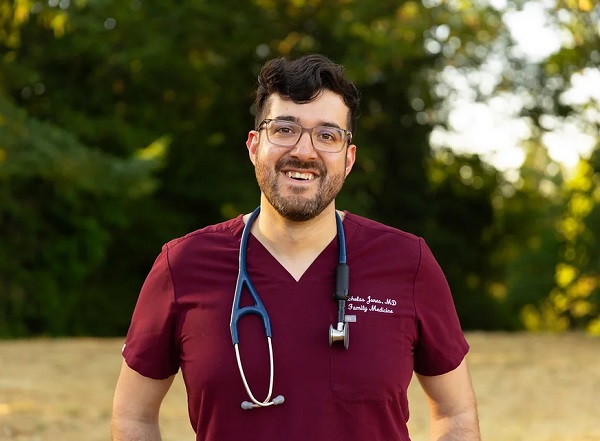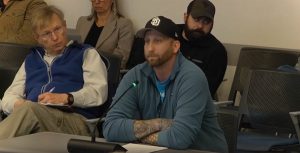Local physician adopts direct primary care, advocates for patients
8 min read
Eugene’s health care system has changed dramatically in recent years. Some doctors are asking: Is there another way? One physician left Oregon Medical Group after its acquisition by Optum. At the citywide forum on health care Sept. 26:
Dr. Nicholas Jones: Hello, my name is Dr. Nicholas Jones and I think I’m here because I am a young outspoken physician. I’m a family physician. I moved here back in 2019.
[00:00:30] My wife and I were seeking work-life balance in the beautiful Pacific Northwest. I only looked at positions that were independent physician-owned practices.
[00:00:41] I understood in my residency training the inherent conflict of interest that there can be with working for hospital systems, or private equity looking to put profits over patients, or insurance companies.
[00:00:55] And so Oregon Medical Group in 2019 was fantastic. Instead of ‘wining and dining’ me, they ‘sack lunch and waterfall’-ed me, which was amazing. And the group of people that I worked with there over the three years of the pandemic were fantastic. They are some of the most caring and hardworking, resilient people I had the pleasure of working with.
[00:01:18] However, over the three years that I spent there, that physician leadership that I was seeking increasingly became apparent that it was more physician middle management than anything else, once they had been acquired by Optum.
[00:01:34] The physician leadership that we really cared about and that I felt was really important to how you run a clinic, that significantly changed over time. And it was subtle and it was slow, but more and more physicians got fed up, whether it was that they weren’t allowed to change their hours around daycare and they had to make difficult decisions like that.
[00:01:56] Or, like was more common, suddenly we saw medical assistants leaving to Dairy Queen or to other jobs because we just weren’t paying high enough. And it felt like every single meeting there would be physicians advocating for: ‘We need to pay our staff more, we need to pay our nutritionists more, we need to accommodate part-time,’ all of these sorts of things and it just never happened.
[00:02:17] So more and more work fell on fewer and fewer people and I think it introduced what I prefer to refer to as moral injury, repeated moral injury. Not burnout, because it’s not the fault of the individual, it’s the fault of the system.
[00:02:33] But when these individuals, very kind, very hardworking individuals, and not just doctors, but nurses, nutritionists, medical assistants, are forced to continue to self-sacrifice and deliver results that are subpar and aren’t to what they imagined themselves doing in health care, it reached a boiling point.
[00:02:54] And there were, unfortunately, some legacy contracts that initially had noncompete clauses and pushed some doctors out of the community.
[00:03:04] And I think that very strongly that we should do away with all of that. That doctors are the ones choosing to go into health care. They’re sacrificing a decade of their prime years, they’re on average coming out with over a quarter million dollars of debt to learn the art and science of medicine. And somehow the people that recruit them, you know, they have the secret recipe, right, so to speak.
[00:03:28] And I think a lot of physicians like myself have recognized that there’s alternative ways of providing care that don’t cost millions and millions of dollars, that do allow physicians to have complete practice autonomy and work with patients and payers to save the patients money and give them direct access to care.
[00:03:48] So in 2023, I founded Clear Health Direct Primary Care where I’m able to focus on advocacy, affordability, availability, and accessibility for patients. Some of that advocacy work that I do, I serve on the board for the (Lane) County Medical Society, trying to strengthen connections between physicians in our community.
[00:04:10] I serve on a corporate practice of medicine workgroup and a universal healthcare access workgroup through the Oregon Medical Association, and additionally I’m part of the External Affairs Committee for the Oregon Academy of Family Physicians.
[00:04:24] Because as a young outspoken physician, I think it’s not enough for my practice to do well. I think we need to rethink health care.
[00:04:33] We need to rethink the incentives and the core underpinnings of how health care works, because unfortunately it’s my perspective that right now the health care system is unfortunately working as designed and we just struggle to access care. And as physicians, as nurse practitioners, as physician assistants, we do our best day by day, patient by patient, to make connections. That’s why a lot of us go into the field.
[00:05:05] But there’s just a lot of people out there that we can’t help and unfortunately the way incentives and the system is designed, it encourages volume. It encourages a number of visits per day, or clicking a ton of boxes to prove that you as a physician have value, but also to make patients look as sick as possible on paper, so you can get higher rates of reimbursement.
[00:05:26] The current model, the way things have been structured, is pay per visit. And that doesn’t make sense. That’s just sheer volume.
[00:05:35] And the relatively new movement towards value-based care: The idea behind it is great. How do we pay for the value that these clinics can deliver? But we need to think beyond that. We need to think better than that.
[00:05:48] If we can have it so that family physicians, rather than medical students and premedical students rotating and just seeing the gobs of red tape and the binding of their hands and not being able to care for people, not being able to understand their patients and choosing, ‘Maybe I’d rather be in the operating room. Maybe I’d rather be a specialist,’ or, as I like to call them, individualists.
[00:06:13] My hope is that they choose primary care and they can have a well-paying job and they can have autonomy and they can lead these teams and make a difference in their communities, and we can have an influx of primary care physicians. And I hope with some of the legislative actions that we take this upcoming session, and with some of the work Health Care for All Oregon is doing, that we can help make that at a national level, and let physicians, young physicians, know that this is an awesome state to work in.
[00:06:41] As that outspoken physician, I want to mention: We need to invest in it, right? We need to have the underlying financials to support all of the care team, right? And you need to be able to have the resources and think: How do we put value, money, behind health rather than sickness? How do we get community health workers paid for? How do we get nutritionists, dietitians, physical therapists, all of these other care teams paid for?
[00:07:12] I just today had a payer deny a vertigo medication on a patient and wanted authorization and diagnostic codes and all of this stuff for something I can get for three cents a pill, right? I have a patient whose oncologist recommends, rather than mammogram after her mastectomy, MRI annually for surveillance because of the type of cancer, but insurance thinks that mammogram is equally efficacious. And so she has to pay out of pocket for that MRI. And agreed with the oncologist to do it every other year, not meeting the advice of the oncologist, but doing it for cost-effectiveness.
[00:07:50] Well, her out-of-pocket cost for the MRI was close to $3,000 per MRI, that I was able to negotiate for $600, right? And the imaging facility is able to still make money at that rate. But that’s what happens when you eliminate all of the different third parties and streamline the cost (applause) to what it really costs.
[00:08:12] And so I think that as a family physician, we take a lot of pride in trying to get the best treatment option for our patients, and a lot of times, a lot of times, especially in our training, we memorize the $4 formulary. We memorize what medications they can get, you know, $10 for a three-month supply.
[00:08:31] But when we work in a practice and you’ve got dozens of different insurance plans, each with different types of tiers and co-pays and deductibles, we don’t know what some of these things we recommend for our patients really cost. And that can be really detrimental. I can think of so many times where I send a patient for some type of study, some type of medication, and when we follow up, ‘Sorry, Doc, I never got it done. It was too expensive,’ or, ‘It wasn’t covered.’
[00:08:57] At times it feels as a physician that it’s the insurer or the payer practicing medicine and trying to pose as a medical provider rather than a payer.
[00:09:07] Another question we have to think about at a systemic level is: Why is it so hard to run a clinic? Why is the overhead so high? And as it was mentioned earlier, why does it take millions and millions of dollars to play the game? That just doesn’t make sense.
[00:09:26] Just briefly, as far as value and outcomes for value-based care. I think there’s a lot to be said for a model that values time, right? And I think that the per-member, per-month model is exactly how my clinic operates, and I think is a way of isolating doctors from a lot of the complexity and conflicts of interest and problems that we have.
[00:09:49] And when we have a health care system in the Pacific Northwest that isn’t bought in fully to value-based care, we have an opportunity to skip the reality of, you know, it takes money to make money, and it takes huge investments to build these systems to optimize value-based care models.
[00:10:08] And if we can instead devise a way to care for the entire community in a easier-to-manage-and-administrate model, like a per-member, per-month model, we can experience all of those wonderful benefits.
[00:10:23] And my call to action is, you know, not just to talk, but to vote and to get engaged this next legislative session, right? There’s hundreds of bills that come forward every year on health care. Not all of them make it to a vote, but there’s going to be a key few that address things like universal access to health care, things like the corporate practice of medicine and noncompetes and all of those sorts of things.
[00:10:49] And as the legislative session progresses, we can all take it a step further and let our representatives know what we support, why we support it, and share our experiences. Thanks again.
[00:11:01] John Q: A call to action from Dr. Nicholas Jones at the citywide health care forum, sponsored by the Churchill Area Neighbors.
Image courtesy Clear Health Direct Primary Care.
See also:






